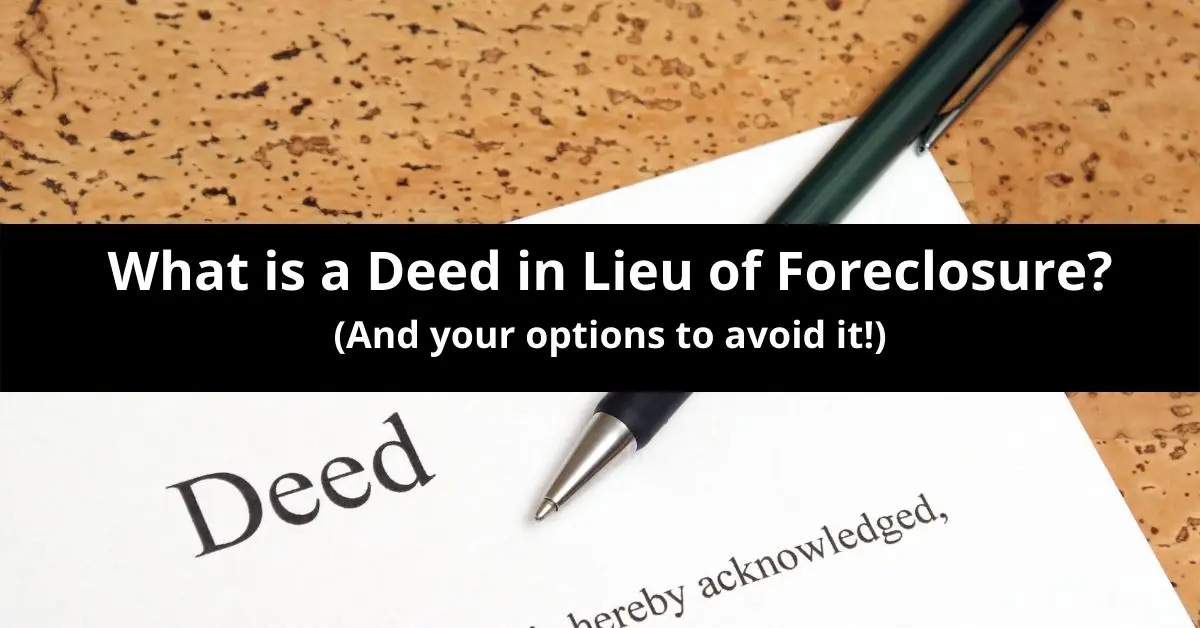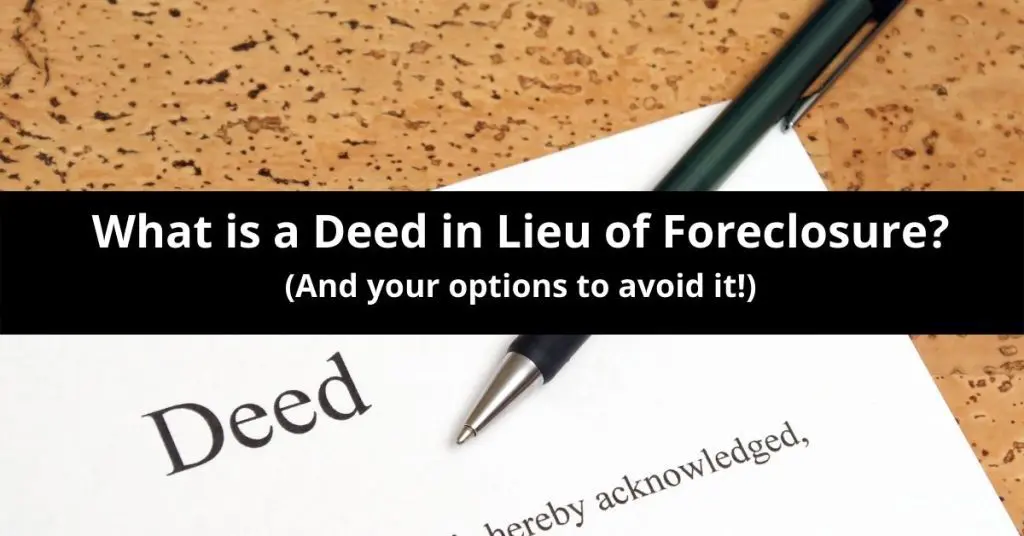A deed in lieu of foreclosure is an agreement between you and your lender where you give ownership of your property (the deed and title) to your lender so that you can avoid going into a full foreclosure. A full foreclosure will wreak havoc on your credit score, and agreeing to do a deed in lieu of foreclosure will still have a negative impact, but it is normally less than a full foreclosure.
The negative impact on your credit score from a deed in lieu is because you are going through a process where your missed payments are still recorded, and so are liens; but you transfer the deed (property title) to the lender willingly vs. having it taken away. A deed in lieu of foreclosure gives you an out from a bad investment, in this case a home which you cannot afford unlike a foreclosure where you risk even more issues arising on your credit score.
The process of a deed in lieu of foreclosure includes:
- Contacting your lender and requesting a Deed in Lieu of Foreclosure Contract.
- Proving financial hardship to your lender.
- Attempting to sell your home at fair market value (if determined by your lender).
- Exiting the property once asked by your lender.
Once you and your lender have agreed to a deed in lieu of foreclosure, you are relieved of all liens and financial obligations tied up in a property.
Although a deed in lieu of foreclosure does not have as severe of consequences for your credit as a foreclosure does, it is considered a last resort option for the following reasons:
- There is no guarantee that your lender will agree to this contract.
- The process of a deed in lieu of foreclosure could take up to 90 days for your lender to conduct a proper appraisal and analyze your mortgage.
- Waiting for approval could take away from valuable time exploring other options to avoid foreclosure.
If your lender determines that a deed in lieu of foreclosure is their best route to recoup their money, then you might get approved. However, you are better off exploring other options to avoid foreclosure altogether.
For example, if you could sell your home much more quickly than turning over the deed, you can avoid losing everything. In some cases refinancing your loan can help lower payments making your house affordable once again. We’ll get into these options in a bit, but first lets look at the benefits and negatives with using a deed in lieu of foreclosure.
Pros and Cons of a Deed in Lieu of Foreclosure
Pros:
- Eliminate any mortgage obligations.
- Deed in Lieu only stays on your credit for 4 years as opposed to 7 years for a foreclosure.
- Allows you to walk away from a bad investment.
- You may qualify for relocation assistance.
Cons:
- May delay your ability to finance a home through Fannie Mae or FHA.
- Negatively impacts your credit if you had a high credit score and still has a negative impact if you had a low credit score (source).
- Lose out on profits from the sale of the property.
- Debt forgiveness above $600 gets taxed as income (source).
Although a deed in lieu of foreclosure is better than foreclosure, your best option is to avoid both by finding an alternative to a deed in lieu of foreclosure.
Alternatives to a Deed in Lieu of Foreclosure
Refinancing or Loan Modification
Refinancing or loan modification is one alternative to a deed in lieu of foreclosure and you may be able to keep your home as a bonus.
Refinancing your home simply means you are agreeing to a new loan. On the other hand, a loan modification changes the existing loan terms. Both refinancing and loan modifications help make your mortgage more affordable so you can keep your house and avoid having to sign a deed in lieu of foreclosure.
Here is how they can do this:
- Both extend the length of the loan to reduce monthly payments.
- Depending on the current market rates, they can reduce the existing loan’s interest rate.
- You may be able to delay payments on the principal.
- Lenders might be open to changing the mortgage to a fixed or adjustable interest rate in order to find a more affordable rate that meets your needs.
With that said, refinancing or loan modification terms may make your home more affordable in the short term, but you could end up paying more in the long run. For example, extending the length of your loan may reduce your monthly payments, but it will also increase the loan’s total interest. So if long-term affordability is a concern, selling your home via a short sale may be better for your financial situation and personal well-being.
Short Sale
A short sale is an agreement between you and your lender to sell the home at a lower price than what the mortgage is worth. Just like a deed in lieu of foreclosure, a short sale will impact your credit negatively, but the common belief is that a deed in lieu of foreclosure will have a smaller impact on your credit score than a shot sale (source). A lender may agree to a short sale of the home if they feel that this route will give them the best return on a sale instead of a deed in lieu of foreclosure.
Unfortunately, not all lenders will agree to a short sale of your home. Additionally, you will not get any money from the home’s sale, and you will walk away with nothing. For this reason, you may consider selling your house directly to a motivated buyer before you reach the point where you try to negotiate a deed in lieu of foreclosure.
Sell Your Home for Cash
One last option is to sell your house for cash. If your home is entering foreclosure, you may not have the time to sell it through traditional means. But there are plenty of “we buy houses” companies like ours, that will make you a fair cash offer and purchase your home before it can be foreclosed on. Although you still lose your home, unlike a deed in lieu of foreclosure or a short sale, you walk away with cash in your pocket. You can use this cash to pay for rent until you get back on your feet, pay down bills, or to get a fresh start.
And now you know what a deed in lieu of foreclosure is, what the process will do to your credit score and the alternatives you have if you’d like to avoid having to negotiate a deed in lieu of foreclosure agreement with your lender. And if you find yourself needing to sell your house fast, call us at (877) 804-5252 and one of our professional house buyers will get you a quote asap.



